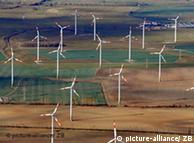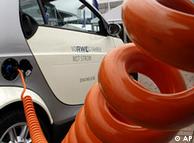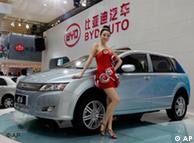AUTO INDUSTRY | 17.09.2010
Chinese electric cars could soon plug into Germany
RWE and China's BYD have teamed to bring electrical cars to Germany, beginning with a trial fleet in 2011. A mass rollout in Germany and several other European markets is planned the following year.
The deal with the Chinese company, a battery specialist that has since expanded into car manufacturing, follows a string of agreements with other manufacturers, including France's Renault, Japan's Nissan and Daimler.
The centrepiece of the agreement is a package deal for electric car enthusiasts, consisting of BYD's electric vehicles and RWE's fast-charging posts and electricity supplied exclusively from renewable sources. Two models will be initially available and targeted primarily at consumers in cities driving shorter distances.
Already on the market
The one model is a plug-in hybrid car that combines new electric and conventional internal combustion systems. On the market in China since early this year, it has a range of between 60 and 100 kilometers when running only on electricity. The other newer model will be a purely electric vehicle with a battery range of about 300 kilometers and an acceleration of 0 to 100 kilometers per hour within 10 seconds.
 RWE plans to charge electric cars with electricity from rewewable energy sources
RWE plans to charge electric cars with electricity from rewewable energy sources
The package will include a fast-charging device from RWE, access to the company's expanding network of public charging points – now at around 450 – and electricity generated by wind and solar systems.
RWE spokesman Peter Hoscheidt told Deutsche Welle that no decision has yet been reached on whether the cars and charging unit can be leased in addition to being purchased or both and what the prices will be. But he said both options will be likely and prices will be attractive to garner attention.
In Berlin, the German energy company is already collaborating with Daimler in a field trial. They're testing Smart cars powered by lithium-ion batteries, which can be charged at home and public supply points. The collaboration is one of several electric car initiatives running under the German government's e-mobility program.
Seeking standardization
Through their collaboration, RWE and BYD also hope to contribute to standardization efforts in the nascent electric car industry. Standardized components are crucial to kick start mass production. But the standardization process of a new technology, like electrically powered cars, is often accompanied by power struggles between groups seeking recognition of their own systems as standards in order to collect royalty fees down the road.
 RWE sees the day coming when "fill it up" is replaced by "charge it up"
RWE sees the day coming when "fill it up" is replaced by "charge it up"
Why the cooperation with a Chinese manufacturer now? Because the Chinese, Hoscheidt said, promise mass production by 2012, thus ensuring a sufficient supply of competitively priced vehicles.
"This is by no means an exclusive agreement," he said. "We're seeking partners to push electric cars. The sooner they can deliver, the better."
Coveted battery technolgy
Earlier this year, BYD and Daimler signed an agreement to develop and build electric cars for the Chinese market. The cars will be sold under a jointly owned brand. Daimler plans to take advantage of BYD's battery technology to help boost Chinese sales.
BYD is China's sixth-biggest car manufacturer by sales last year. American billionaire Warren Buffet owns 10 percent of the company.
But Ferdinand Dudenhoeffer, a professor at the University of Duisburg-Essen and an expert on the German auto industry warns about expecting too much too soon from Chinese car makers.
"Let's see what comes," he told Deutsche Welle. "We've seen a few Chinese manufacturers come to Europe, and they've failed."
BYD's car sales have been dropping noticeably in its home market, according to Dudenhoeffer. "There's plenty of demand in China but other cars are apparently in greater demand," he said.
Nevertheless, Dudenhoeffer welcomes the latest attempt to push electric cars in Germany.
"There's a lot more happening in a number of countries like France," he said, pointing to financial incentives. "In Germany, there's still just a lot of hot air."
Author: John Blau
Editor: Cyrus Farivar


1 comment:
βέβαια οι γερμανοί οπότε θέλουν και με μαζική παραγωγή γεμίζουν τους δρόμους με ηλεκτρικά κάρα και δεν καταλαβαίνω γιατί περιμένουν τα κινέζικά να κυκλοφορήσουν πρώτα στην Γερμανία.Μπας και θέλουν να αντλήσουν συμπεριφορές και μαθήματα από το νέο περιβάλλον ?
Post a Comment